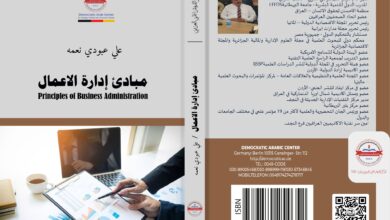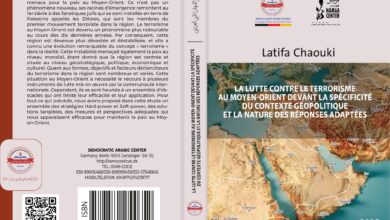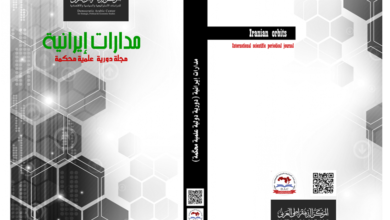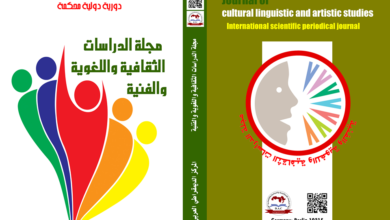مقالات وآراء في التاريخ واللغة والثقافة
Articles and Opinions on History, Language, and Culture
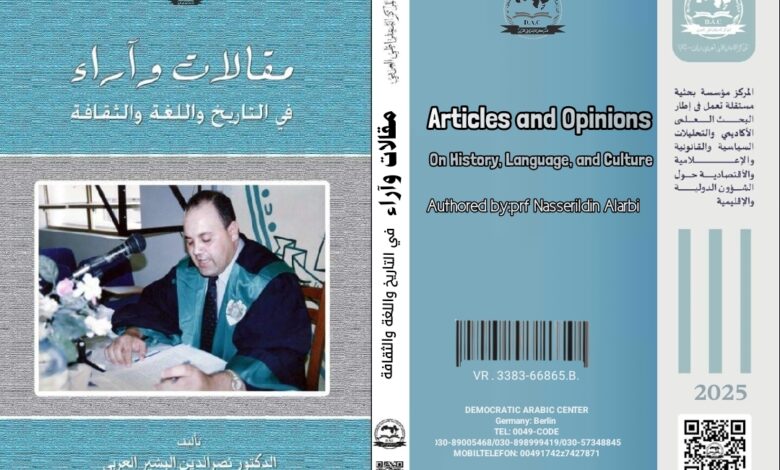
تأليف : أ.د نصرالدين البشير العربي – مدير المركز الليبي للدراسات الثقافية- الهيئة الليبية للبحث العلمي – ليبيا
نسخة “pdf”-
مقالات وآراء في التاريخ واللغة والثقافة
الطبعة الأولى “2025″ –من كتاب : مقالات وآراء في التاريخ واللغة والثقافة
جميع حقوق الطبع محفوظة #المركز_الديمقراطي_العربي ولا يسمح بإعادة إصدار هذا الكتاب أو اي جزء منه أو تخزينه في نطاق إستعادة المعلومات أو نقله بأي شكل من الأشكال، دون إذن مسبق خطي من الناشر .
تقديم : –
إن بداياتي مع مجموعة هذه الأبحاث والمقالات وعروض الكتب العلمية التي تجمعها دفتي هذا الكتاب، بدأت منذ شغوفي بالدراسة وحب الكتابة والاطلاع، وتشجيع أساتذة أجلاء كان لهم الفضل بالمتابعة والنصح والمراجعة وإسداء الرأي والمشورة وإبداء الملاحظات العلمية حتى خرجت بهذه الصورة. ولذلك أنا أقدم للقارئ هذا الكتاب والذي جمع مجموعة من البحوث والمقالات العلمية المنشورة في المجلات العلمية المحكمة بالجامعات والمراكز البحثية في ليبيا والجزائر ومصر والمغرب وبريطانيا واندونيسيا. ولقد قسمته إلى مقدمة وثلاثة فصول، فكان الفصل الأول يشمل البحوث العلمية المتخصصة في مجال التاريخ واللغة والكتابة التاريخية التي نشرت في المجلات العلمية المحكمة بالجامعات الليبية والعربية والأجنبية، وهي بحوث ذات صبغة علمية، حاولت من خلالها تقديم دراسات متنوعة حول تاريخ ليبيا الحديث، تناولت في بعضها حقبة الاستعمار الإيطالي والأطماع الاوروبية في ليبيا، كما قدمت لشخصيات علمية ثقافية كان لها أثر بالغ في الدراسات الدينية، وكذلك استعرضت الحرف التقليدية في المجتمع الليبي متخذا صناعة الجرد أنموذجاً، كما استعرضت بحوث في الدراسات اللغوية متمثلة في انتشار اللغة العربية في افريقيا وتأثيرها على اللغات الافريقية، وقدمت اللغة الطارقية والهوساوية والفلانية كنماذج لذلك، وخصصت جزءا لاباس به لدراسة المخطوطات العربية بالمكتبات العالمية مكتبة أحمد بابا التمبكتي أنموذجاً، وأنهيت هذا الفصل بدراسة حول حقوق الإنسان والتنمية البشرية، لذلك جاءت البحوث العلمية في هذا الفصل، جلها تمس الجانب التاريخي والثقافي واللغوي في ليبيا والوطن العربي وإفريقيا.
وإما الفصل الثاني فقد استعرضت فيه مجموعة من المقالات العلمية التي شاركت بها في المؤتمرات والندوات العلمية المتخصصة. وكان من أبرزها مقالة بعنوان: “الارهاب المفهوم والتطور التاريخي مشيراً إلى مذبحة المنشية بمدينة طرابلس كنموذج”، وأيضا مقالة بعنوان:”من ذكريات العمالقة، الصحفي الاديب علي مصطفى المصراتي”، وكذلك مقالة بعنوان:” استراتجية الأمن الليبي ومعنى الامان” من خلال دراسة الواقع السياسي، وأنهيت الفصل بمقالة:”ذكرى يوم الحداد” موضحاً ذكري تاريخ 26 – 10 – 1911 م وإعلان الحداد على المنفيين الليبيين بسجون الجزر الإيطالية فترة الاحتلال.
أما الفصل الثالث والأخير فقد خصص لدراسة وعرض لبعض المراجع والكتب العلمية القيمة، وهي ذات صبغة علمية تخص القارئ الباحث، وأيضا ينتفع بها القارئ العام من حيث المعلومة والإطلاع على هذه الاصدارات. وكانت على النحو التالي: قبائل الطوارق ” دراسة وثائقية للأستاذ الدكتور الهادي المبروك الدالى، وكتاب قبائل الهوسا دراسة تاريخية، للأستاذ الدكتور الهادي المبروك الدالي، وكتاب المساجد الإسلامية في المدينة القديمة بطرابلس في العهد العثماني الأول من 1551 – 1711 م دراسة للباحث إبراهيم سالم انويجي، وختمت الفصل بقراءة في كتاب إيطاليا من أجل الصحراء ” مشاهدات المراسل الحربي البريطاني مع الإيطاليين في طرابلس للكاتب البريطاني فرانسيس ماكولا.
متمنباً من الله سبحانه وتعالى ان يكون كتاب: ” بحوث ومقالات وآراء في التاريخ واللغة والثقافة “ في تطلعات القارئ الليبي والعربي والإسلامي والذي اريد من خلاله اعطاء الرأي العلمي السديد، ومحاولة معالجة بعض المواضيع العلمية في عالمنا العربي والإفريقي والإسلامي بالأساليب السليمة والصحيحة وتقديم المفيد والجديد قدر ما استطعت الى ذلك سبيلا .
فهذا آخر ما قصدت وتمام الوعد الذي وعدت، ولا آمن من أن أكون أخطأت سهواً، ورحم الله امراً رأى خللاً فأصلح أو عاين زللاً فمسح، فإن الخطأ والخــلل غير مســــتغرب من الإنسـان المطبوع على عدم الاستحسان، وخصوصاً من كان مثلي قليل العلم قصير الباع في الحفظ والفهم والبيان.
Abstract
My beginnings with this collection of research papers, articles, and scientific book reviews, gathered within the covers of this book, trace back to my passion for study, love for writing and exploration, and the encouragement of esteemed professors who played a significant role through their guidance, advice, reviews, and valuable academic feedback. Thanks to their contributions, this work has come to light in its present form.
Therefore, I present to the reader this book, which compiles a selection of academic research papers and articles published in peer-reviewed journals affiliated with universities and research centers in Libya, Algeria, Egypt, Morocco, the United Kingdom, and Indonesia. I have divided it into an introduction and three chapters.
The first chapter includes specialized academic research in the fields of history, language, and historiography, published in peer-reviewed journals at Libyan, Arab, and international universities. These are scholarly works through which I aimed to provide diverse studies on modern Libyan history, some of which addressed the era of Italian colonization and European ambitions in Libya. I also highlighted influential cultural and scholarly figures in religious studies, examined traditional crafts in Libyan society using the craft of jarid (palm-weaving) as a model, and explored linguistic studies related to the spread of the Arabic language in Africa and its influence on African languages. I presented Tuareg, Hausa, and Fulani as case studies. Furthermore, I dedicated a significant portion to studying Arabic manuscripts preserved in global libraries, taking the Ahmed Baba Institute in Timbuktu as an example. I concluded this chapter with a study on human rights and human development. Thus, most of the academic works in this chapter address historical, cultural, and linguistic aspects related to Libya, the Arab world, and Africa.
The second chapter presents a collection of scientific articles I contributed to specialized academic conferences and symposiums. Notable among them is an article titled “Terrorism: Concept and Historical Evolution,” in which I discussed the Manshiya Massacre in Tripoli as a case study. Another article is titled “From the Memories of Giants: The Journalist and Literary Figure Ali Mustafa Al-Musrati.” Additionally, I wrote “Libyan Security Strategy and the Meaning of Safety,” a study analyzing the political reality. I concluded the chapter with an article titled “The Day of Mourning,” discussing the historical event of October 26, 1911, and the declaration of mourning for Libyans exiled to Italian island prisons during the occupation period.
The third and final chapter is dedicated to reviewing and presenting several valuable academic references and scientific books. These works serve both specialized researchers and general readers seeking knowledge and insight into these publications. The works discussed include: “The Tuareg Tribes: A Documentary Study” by Prof. Dr. Al-Hadi Al-Mabrouk Al-Dali; “The Hausa Tribes: A Historical Study,” also by Prof. Dr. Al-Hadi Al-Mabrouk Al-Dali; “Islamic Mosques in the Old City of Tripoli during the First Ottoman Period (1551–1711)” by researcher Ibrahim Salem Anweiji; and I concluded the chapter with a review of the book “Italy for the Sake of the Desert: Observations of the British War Correspondent with the Italians in Tripoli” by British author Francis McCullagh.
I ask Almighty God that this book, titled “Research, Articles, and Views on History, Language, and Culture,” meets the expectations of Libyan, Arab, and Muslim readers. My aim has been to offer sound academic opinions and address some of the pressing academic topics in our Arab, African, and Islamic world using accurate and constructive approaches, providing insights that are both beneficial and innovative, to the best of my ability.
This marks the conclusion of my intent and the fulfillment of the promise I made. I do not claim infallibility and seek forgiveness for any unintentional mistakes. May God bless those who identify flaws and correct them, or notice errors and amend them. After all, error and imperfection are natural to humankind—especially someone like myself, with modest knowledge, limited memory, and humble expression.
الناشر: المركز الديمقراطي العربي للدراسات الإستراتيجية والسياسية والاقتصادية
Democratic Arabic Center- Berlin – Germany


